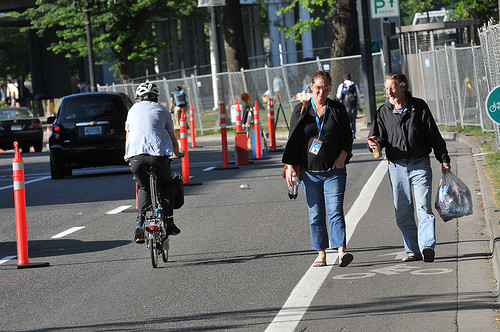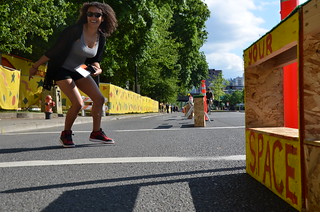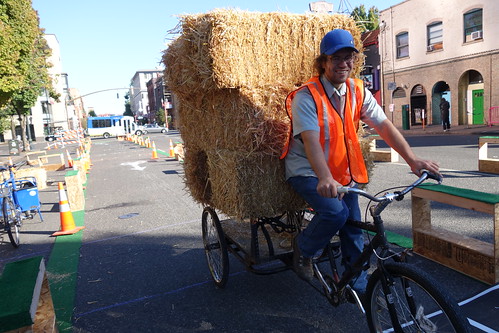One of Portland’s most interesting annual traditions just got a little more official.
After three years of doing short-term demos themselves, the volunteer-led street reinvention group Better Block PDX has struck a formal partnership with Portland State University’s Toulan School of Urban Studies and Planning. With the help of PSU planning and engineering students, this new partnership means Better Block will constantly churn out a pipeline of projects that temporarily re-envision public spaces around Portland.
The new agreement will create one of the only academic programs in the country to integrate hands-on uses of “tactical urbanism,” as these lightweight, flexible projects are often called, directly into a student curriculum.
The partnership began as a concept by former Better Block organizer Boris Kaganovich and has been embraced by Better Block’s current acting chair, Ryan Hashagen.
“It’s clear to me that tactical urbanism is going to be more and more a standard part of what planners do.”
— Nick Falbo, Alta Planning and Design
“The vision that Ryan has, and the one that I’ve sort of grabbed onto, is that we can institutionalize tactical urbanism to a degree that’s never really been seen before,” said Nick Falbo, a senior planner for the local firm Alta Planning and Design who co-teaches PSU’s annual two-credit, ten-week lab focusing on bike and pedestrian planning. “It’s clear to me that tactical urbanism is going to be more and more a standard part of what planners do.”
The PSU lab Falbo co-leads is an optional companion to the Toulan school’s winter class on bike and pedestrian planning. Students pursuing a master’s degree in urban and regional planning take it; so do undergraduates pursuing any course of study.
“Historically we’ve done a variety of different — what do I call it? They’re not fake plans, they’re like planning exercises,” Falbo said Wednesday.
The new partnership will make the students’ work less theoretical and more concrete.
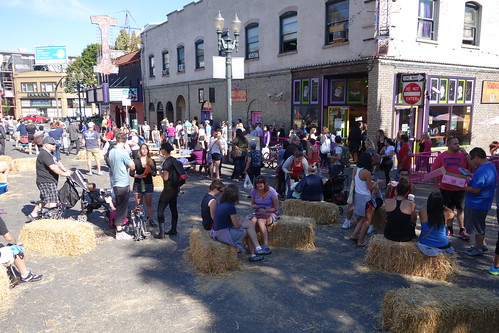
(Photo: Greg Raisman)
Here’s the vision for how it’ll work: each spring and summer, Better Block will collect proposals from neighborhood and community organizations who want to temporarily rework street space into space for walking, sitting or playing — much as Better Block has done in past years on blocks of Southwest Stark, Southeast Clinton and Southwest 3rd.
Each fall, Better Block will pass ideas to students in the PSU planning lab. They’ll break into teams of four or five, each of which will be assigned a project to develop. Then in the winter, the planning students will hand some of those projects over to a separate lab of engineering students, who will fill in technical details like stripes and traffic signals.
Advertisement
After that the projects will return to Better Block, which will recruit volunteers to put plans into action each spring and summer — at which point the cycle will begin again.
The first run-through is already half finished. Falbo and his co-instructor Mike Rose just wrapped up the first term of the planning lab.
Hashagen said Better Block has chosen four of the projects students worked on in the fall lab and is planning to unveil them at a Feb. 18 general meeting at the Oregon Walks office, 1805 NE 2nd Ave.
“We’re really trying to make the February meeting a big deal,” Hashagen said. “We want to bring out a lot of folks.”
Hashagen credited various PSU instructors and faculty with being open to the new partnership, including Drusilla Van Hengel, Jennifer Dill, Chris Monsere, Evan Kristof, Rose and Falbo.
Falbo said he thinks that Better Block style projects are likely to become a common part of cities’ outreach and engagement process.
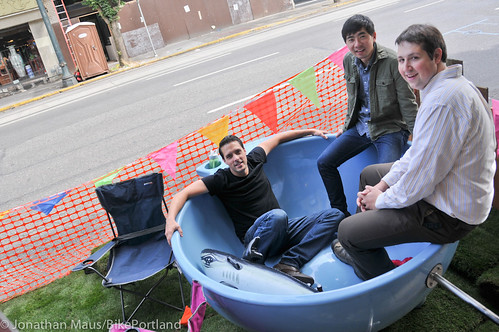
(Photo: J.Maus/BikePortland)
“Just helping people get over that hump of ‘this place can be different’ — I think it’s incredible for that, really,” Falbo said. “You often hear about projects that get put on the ground, they get funded and they get built, and then suddenly community members are surprised. … I don’t think there’s any better way for people to be aware, ‘Oh, changes are coming.’ Because they see it on the ground. Instead of encountering it in its unchangeable state, they’re encountering it in the completely flexible design state where their ideas and feedback can be incorporated into the final design.”
Falbo only mentioned one downside of the plan: the amount of time it tends to demand of students who sign up.
“I feel bad when I think about how much time they probably put into getting these projects done,” Falbo said.
— Michael Andersen, (503) 333-7824 – michael@bikeportland.org
BikePortland can’t survive without paid subscribers. Please sign up today.
Correction 3 pm: A photo caption in an earlier version of this post misstated the location of the parklet in the final picture.
